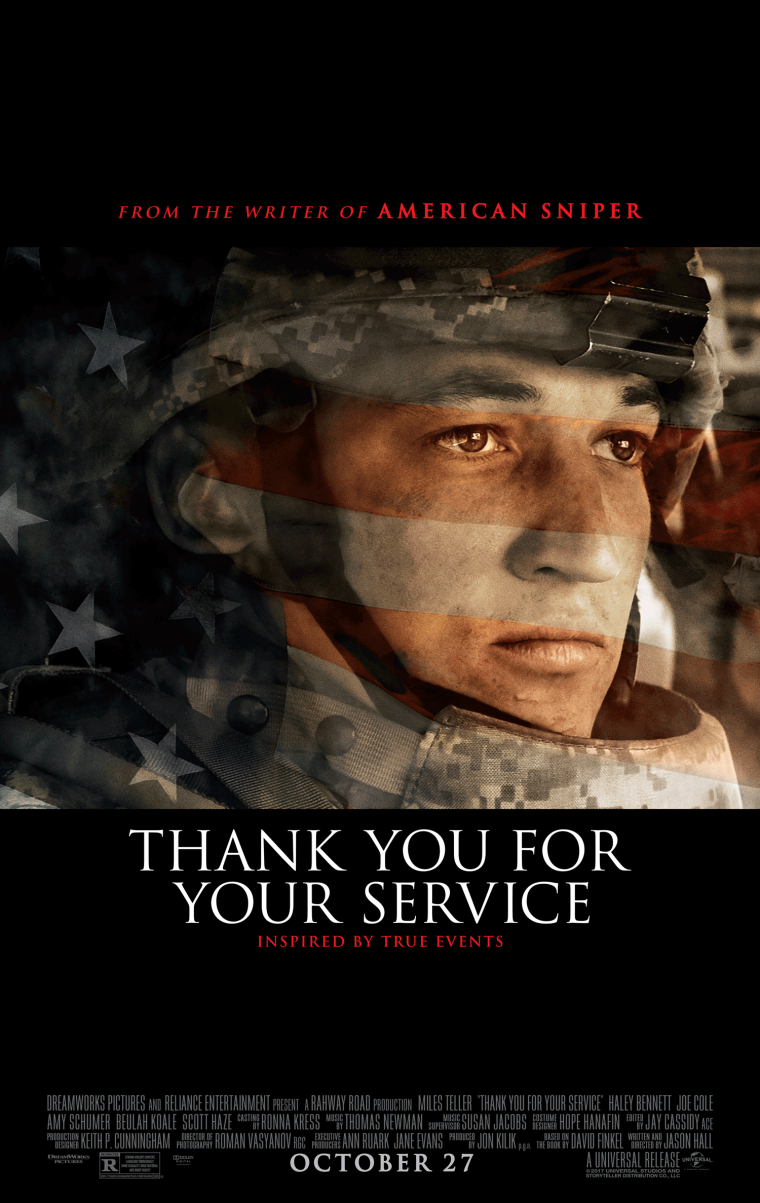
“I just can’t wrap my mind around it.”
So says a member of the military of which one of the characters in Thank You for Your Service comes to, looking for help. For all the thoughts about how to deal with Post Traumatic Stress Disorder, I’ve always considered this one to be potentially the most hurtful, and the most helpful. People look at war veterans as many things: they see them as heroes; they see them as dangerous; they see them as different; they see them as someone they once knew, who is now missing fragments of what made them who they were. But they never see it from the inside; they don’t feel the memories that haunt the mind of the person before them. And sometimes the worst thing they can do is try to understand, because in the nature of understanding, we attempt to put ourselves in the other person’s shoes. Shoes that will never fit, and so we try to force ourselves into them, but that doesn’t work. Eventually through the exasperation of trying, we ask that person to change – “I can’t wrap my mind over why you’re like this.”
Films have dealt with PTSD since The Best Years of Our Lives but it was once a foreign concept, much like PTSD itself. Men were supposed to be brave war heroes returning triumphantly, instead many returned with crimson fingernails and nightmares in their pockets. And movies about war were supposed to be equally triumphant, because they only looked at the surface. The Best Years of Our Lives showed what it meant to be physically and emotionally changed. And eventually films like The Deer Hunter were able to show that the scars of the mind sear the most.
The protagonists of Thank You for Your Service return home with such invisible wounds. They are Sergeant Adam Schumann (Miles Teller), Tausolo Aieti (Beulah Koale), and Will Waller (Joe Cole). Three compatriots who have arrived back in the states on the same flight. When we first meet them, they appear “normal”, or at least as normal as can be expected for men to have spent so much time in Iraq, dodging IEDs and exchanging fire with insurgents. But they talk calmly, joke with each-other, and plan the bachelor party for Will. It soon becomes clear that “normal” is a mask that they use to lie to their loved ones. In truth, they’re lying more to themselves. Solo has lapses in his memory, even unable to remember the day of the week, and succumbs to bursts of uncontrollable rage. Adam is sunk into a deep depression where everything seems hopeless, and he’s almost waiting for the moment where he can give up. And Will, well, I won’t reveal what befalls Will, but he gets it the worst. Adam is supported by his patient and loving wife, Saskia (Haley Bennett), who, despite not knowing what her husband needs, recognizes that he needs something. Tausolo’s wife, played by Keisha Castle Hughes, becomes pregnant – this is a development that Tausolo hopes will snap him out of it, but there’s no such thing as a simple fix in this case. Again, I won’t reveal what goes on with Will.
The film, written and directed by Jason Hall, based upon the non-fiction novel by David Finkel takes an unflinching look at the world of a military veteran who feels adrift at home. When its at its best, Thank You for Your Service feels as thought we’re watching a real-life story with no outside interference from a Hollywood screenplay. We’re forced to watch hopelessly while good people who need help must suffer internally, and it seems as there’s only one very dark way for it to end. But the film makes mistakes by adding forced drama near its conclusion that’s so needless. And I found the contrast to be a distraction.
Miles Teller, in his second performance as a real-life hero in a week (Only the Brave), outdoes himself. His slow-burn of a decent into near madness is subtle and heartbreaking. Even better is the rage of Beulah Koale as Tausolo. He plays it like a man that knows he’s going completely insane, and I was desperate for him to get some help. Bennet and Hughes have the thankless wives roles, but they infuse them sincerely. Amy Schumer (yes, that one) plays the widow of a fallen comrade, and she plays it straight. While I admire her wanting to be a part of a film like this, I wish she had worked her way up to it. She’s perfectly fine as a dramatic actress, but I felt taken out of the film in moments I should have been the most invested.
If you’re going into this story with a fascination or emotional attachment to the subject, I’d say that you will be affected greatly by what Hall has done here. Thank You for Your Service understands the separation between a mind that is normal, and one afflicted with something impossible to comprehend. Because the point of saying you “can’t wrap your mind around” what a person is going through is the moment you can change your approach in how they can be helped. Does that mean there’s hope? For the ones lucky enough, and Thank You for Your Service chooses to leave us with that hope, making it all the more important to keep fighting for it.
Grade: B
